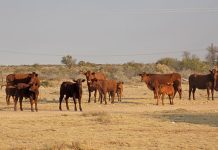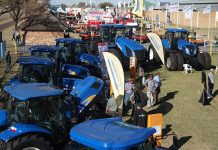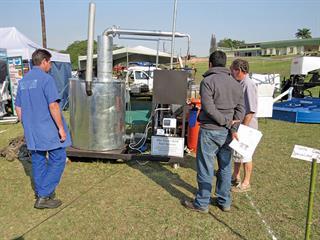As belts tighten globally, there are fears that developing countries will feel the consequences of First World protectionism. While leaders of the G7 last week committed to avoiding protectionist measures, an analytical view by Robyn Joubert shows the writing may already be on the wall for farming.
As the international financial crisis deepens, the temptation for countries to become more protectionist, especially with regard to agriculture, may prove too great to resist.
The EU has already succumbed with dairy experts recently reinstating export subsidies for butter, cheese and whole and skimmed milk powder to help struggling exporters compete where prices have suffered sharp declines over a prolonged period.
The way these subsidies or refunds are introduced is quite simple – when world market prices increase, refunds are reduced; when world market prices decrease, refunds are reintroduced or increased. In this way, lower prices continue to help mop up market surpluses.
The level of subsidies can change monthly to accommodate available stock. They apply for only as long as market conditions dictate and can’t be imposed indefinitely as they are restricted by the Common Agricultural Plan budget. The EU will also not exceed limits on subsidised exports set by the Doha round of World Trade Organization talks.
The decrease in international prices since 2008 and buildup of stocks will result in renewed import pressure on a variety of agricultural products, although no other countries have, as yet, re-introduced export subsidies. However, there’s the threat the US will follow the EU’s example.
“There’s ample provision for it in the US Farm Bill,” said Koos Coetzee, chief economist at the Milk Producers’ Organisation. “They can do it at any time within the new financial rescue package and there will also be some measure to encourage more purchasing of local produce, although the sector specifically mentioned was the steel industry.”
Coetzee said the reintroduction of EU subsidies once again shows developed countries aren’t really worried about market liberalisation or the interests of the international trading community. “They will go along with it as long as it suits them,” said Coetzee. “If prices go down, they will use them.” Export subsidies will impact on local dairy farmers as they affect the world price, making more products available at lower prices. Dairy exports from South Africa are expected to decline, not only as a result of EU measures and the slow-down in global markets, but also due to the industry moving into a lower production period.
A dairy farmer in the KwaZulu-Natal Midlands, Charlie MacGillivray, said subsidies will harm what’s already a fragile industry. “We’re already losing 17c/â„“ due to the imbalance between input costs and output benefits,” he explained. “We don’t need competition from products subsidised by some bloated, rich country.” MacGillivray said cheaper imports might help consumers in the short term “but it’s not a level playing field and it’s anti-competitive” he pointed out. “Products come in at unrealistic prices. What happens when imported products are no longer available and we’re all out of business because we couldn’t compete? From a food security point of view, it’s wrong and from an imperative to employ and keep the local industry buoyant, it’s also wrong.”
A measure offering farmers some respite is the EU agreeing not to export subsidised cheese to South Africa. In addition, the EU subsidy is still low compared to past levels. “At one stage, we saw export subsidies of up to 100% and the value of subsidies was higher than the world price,” said Coetzee. “Also, the EU can’t really dump their products on South African markets as there are still some anti-dumping regulations in place.”
Trade ministers at the recent World Economic Forum in Davos, Switzerland, agreed the global economic downturn would be made worse by self-protectionist measures. Agricultural Business Chamber chief executive Dr John Purchase said South Africa shouldn’t resort to protectionist measures, but government needed to level the playing field by instituting tariffs and engaging in bilateral and multilateral trade negotiations.
While the Department of Agriculture recently stated South Africa needs protection from low-priced imports, it seems it can’t be expected that measures will be fast-tracked. Some two years ago, a trade and tariff policy was developed which is still languishing somewhere between the departments of Agriculture and Trade and Industry, despite prompting from organised agriculture and agri-processing. “However, we’re moving quickly to a free trade agreement with the EU and when it’s introduced in a few years, there won’t be tariffs on either side,” said Coetzee.
EU export subsidies will hurt farmers
As belts tighten globally, there are fears that developing countries will feel the consequences of First World protectionism. While leaders of the G7 last week committed to avoiding protectionist measures, the writing may already be on the wall for farming.
| Read more |
|









